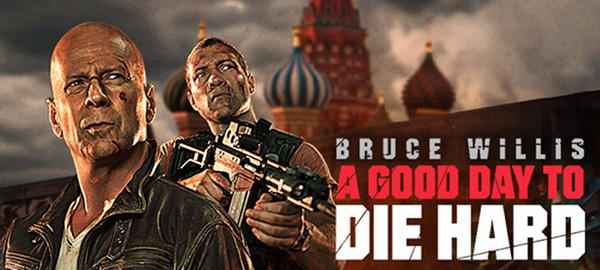
I go into minor spoiler detail here, so read at your own discretion. I can’t talk about why A Good Day to Die Hard is awful without revealing some bits from the plot.
You can’t improve upon perfection. After four films have failed (to varying degrees) to recapture the magic of 1988’s Die Hard, perhaps it’s finally time to put John McClane out to pasture with Roy Rogers.
Maybe such a milestone already occurred, because the John McClane in A Good Day to Die Hard, the 5th entry in an action series spanning a quarter century, is not a John McClane I recognize. Accepting McClane as an indestructible force of unstoppable murder-death-kill, made easier after Len Wiseman established in Live Free or Die Hard that McClane is indeed The Terminator, is tantamount to your enjoyment of A Good Day to Die Hard. Or at least it would be had director John Moore and screenwriter Skip Woods not manufactured one of the more boring action yawns this side of… nope, can’t find the reference. That’s how boring this fucking movie is.
Let’s not confuse hating this with high expectations. Live Free killed the spirit of the franchise when McClane punched a helicopter and won. But Good Day is awful, worse, for reasons both old and new. Moore tries to riff on the history of the series only to remind us of better times, times like two days ago when I hadn’t seen A Good Day to Die Hard.
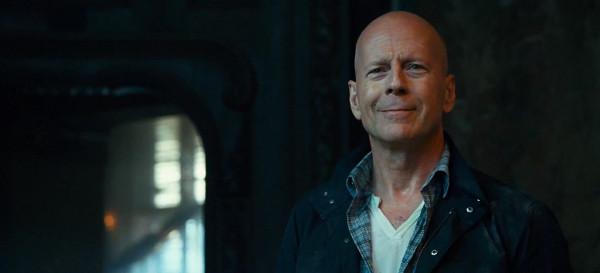
Deserves to be a meme.
The plot is predicated on an old, sleepy John McClane fucking everything up for everybody. Literally dozens of lives would be spared in this film if John McClane doesn’t go to Moscow. He’s there because his son John Jr., played by Australian up and comer Jai Courtney, is imprisoned and testifying against a big fish in a trial with serious governmental ramifications for both US and Russia. But it turns out that the younger John is actually CIA, helping engineer an extraction of a political prisoner. An elaborate escape is thwarted when John Sr. tracks down his son and delays him getting the prisoner to the extraction point, thus the elder McClane causes son and prisoner to miss their window for escape to safety.
This entire movie is John McClane’s fault.
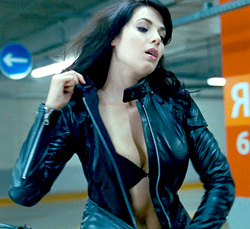 What follows is a mundane exercise in exercising Moore’s ability to direct mundanely. A typical action sequence in A Good Day to Die Hard offers all the passion of a live moose humping a dead moose. The beauty of Die Hard was how it took Bruce Willis’ “ordinary guy” charm and uprooted it, placing it dead center of an extraordinary situation. And the conceit worked in the two sequels that followed. But now Willis is more Willis than McClane, and the character is played with all the subtlety and nuance of John Rambo.
What follows is a mundane exercise in exercising Moore’s ability to direct mundanely. A typical action sequence in A Good Day to Die Hard offers all the passion of a live moose humping a dead moose. The beauty of Die Hard was how it took Bruce Willis’ “ordinary guy” charm and uprooted it, placing it dead center of an extraordinary situation. And the conceit worked in the two sequels that followed. But now Willis is more Willis than McClane, and the character is played with all the subtlety and nuance of John Rambo.
And isn’t it strange, this reversal of roles between McClane and Rambo? Stallone took a character long thought indestructible and made inroads to re-humanizing him in his last effort. Meanwhile McClane, arguably one of the more relatable action heroes of modern times, is now a walking tank. This is a film where McClane and his son blind jump through multi-story windows not once but twice.
Seeing extraordinary men pulling off extraordinary feats doesn’t have to be monotonous, but the audience is unable to gauge the line if the film never establishes it. Where’s the danger? The hook for me to give a shit? The film establishes a set of rules that poisons the entire affair: McClane’s bullets will always land. The bad guys’ will not. McClane and son can survive a thirty-story fall. Bad guys cannot. The McClanes do not need to wear radiation suits in Chernobyl. The bad guys… you get the idea.
And that last aside’s not a joke. You bet your ass we’re going to Chernobyl in A Good Day to Die Hard because… actually, the film’s not terribly convincing in that regard. It just needs another set piece to devour.
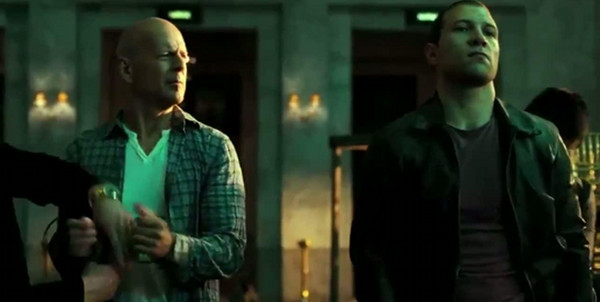
Good Day’s framed in the context of a father and son discovering how they relate to one another – in this case killing bad guys. It’s the most on-the-rails relationship of recent film history, as estranged father and son come together and learn to love each other. Of course there’s a scene where the son overhears a conversation his father has, revealing an unseen tenderness he’d thought lost. And of course the older McClane discovers that, though they were apart, John Jr. grew up to be just like his daddy. Working out paternal issues during gun battles, one wonders if John McClane doesn’t shoot sperm but in fact tiny clichés that burrow into eggs and make bigger, walking clichés the sprout arms and legs.
Jai Courtney walks away with dignity intact, even if his character is an underwritten tree trunk. After this and Jack Reacher I’m convinced that this guy will be a legit presence on the action scene. He has the chops, the stature and the physicality necessary in roles like these, even if that necessity is squandered in an unnecessary film. Willis plays McClane as sleepy and dispassionate, likely because Willis is sleepy and dispassionate. Immense talent yet woefully inconsistent – he keeps his MO.
No Die Hard villain will ever measure up to Alan Rickman’s career-defining turn as Hans Gruber. But A Good Day to Die Hard is downright confused about its bad guys and their intentions. Bad guys turn on bad guys only to turn again and side with the other bad guys who we thought were good guys but were really bad guys. Now give me a tissue. I have a nosebleed from writing that.
Die Hard as a franchise gets spottier the further we move away from the underlying gimmick – put John McClane in a sticky situation and let him quip and shoot his way out. If this film was more centralized, say McClane in the Kremlin rescuing his CIA agent son, maybe it retains some of the magic of those earlier entries. The series up to now has offered an increasingly preposterous yet organic trajectory in terms of setting: building, airport, New York, North America. Setting doesn’t play as important a factor here as you’d suspect. We’re in Moscow until we’re in Chernobyl, and one locale isn’t more meaningful or stimulating than the other. Here’s an abandoned building with some bad guys in it. Now here’s another one. Now here’s Bruce Willis superimposed on a semi:
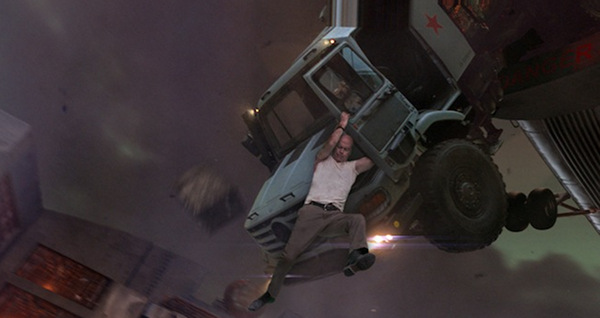
The hell?
Wandering around the internet the past few days it’s clear there’s no shortage of passion for this series – just not onscreen anymore. There’re few bright spots: a chase scene that ends with a crash into a giant concrete pipe, a dude who gets eaten by a propeller. But where you can make an argument for Wiseman’s effort viewed apart from the franchise, A Good Day to Die Hard is neither entertaining as a Die Hard entry or an actual film. It’s a lifeless, passionless journey devoid of any of the brilliance that made us love this series and its hero.
A sequel we’d have been better off without, A Good Day to Die Hard is proof the day improves only if you skip this shitty movie.
Rating: 




Out of a Possible 5 Stars